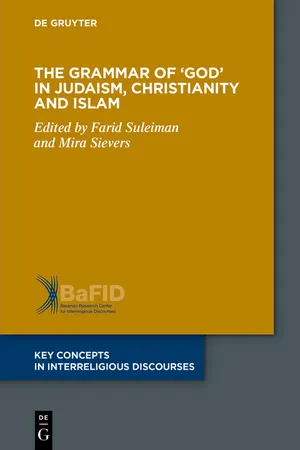
The Grammar of 'God' in Judaism, Christianity and Islam
- 125 pages
- English
- ePUB (mobile friendly)
- Only available on web
The Grammar of 'God' in Judaism, Christianity and Islam
About This Book
Engendering an intimate and deep relationship with God is at the heart of Judaism, Christianity and Islam. This relationship manifests, among other things, in worshipping Him with sincerity, talking to (and about) Him, and being conscious of Him in every moment of life. For believers, God himself plays also an active role in pursuing this relationship by, for example, answering prayers and making the believer know and feel His uninterrupted presence. Many would consider this as common knowledge about the religions mentioned above. However, only few are aware that the meaning of the above differs significantly based on how one thinks that religious language works. Rather, it is taken for granted that the word 'God' refers to a metaphysical being with personal traits and plays a similar role in structure as words in empirical language. This has several implications such as the following: God can be talked about in an abstract and theoretical manner; His existence can be subject to inquiry like that of any other being such as planets or unicorns; and calling God good, while creation is obviously full of evil, is a proposition that needs rational justification. The famous 20th century thinker Ludwig Wittgenstein has famously stated that his goal in philosophy essentially amounts to "showing that things which look the same are really different". By his insistence to pay close attention to the grammar of a word – that is its use in language – he has opened up new perspectives on (not only religious) language that challenges the prevalent view outlined above. The goal of this volume is to pick up on Wittgenstein's insights about language and religion and to bring them in fruitful relation to the three mentioned religious traditions respectively in an attempt to reassess the grammar of the word 'God'.
Frequently asked questions
Information
Table of contents
- Title Page
- Copyright
- Contents
- Introduction Jewish-Christian-Islamic Encounters through Wittgenstein’s Lens: Bridging the Gap between Religious Language and Theology
- “An Equation Entirely Unlike Any of the Familiar Curves”: Wittgenstein on the Grammar of “God,” the Trinity, and the Meaning of Religious Language
- Wittgenstein and the Rabbinic Grammar of God’s Name
- The Grammar of “God” – Muslim Perspectives
- Epilogue
- Index of Persons
- Index of Subjects